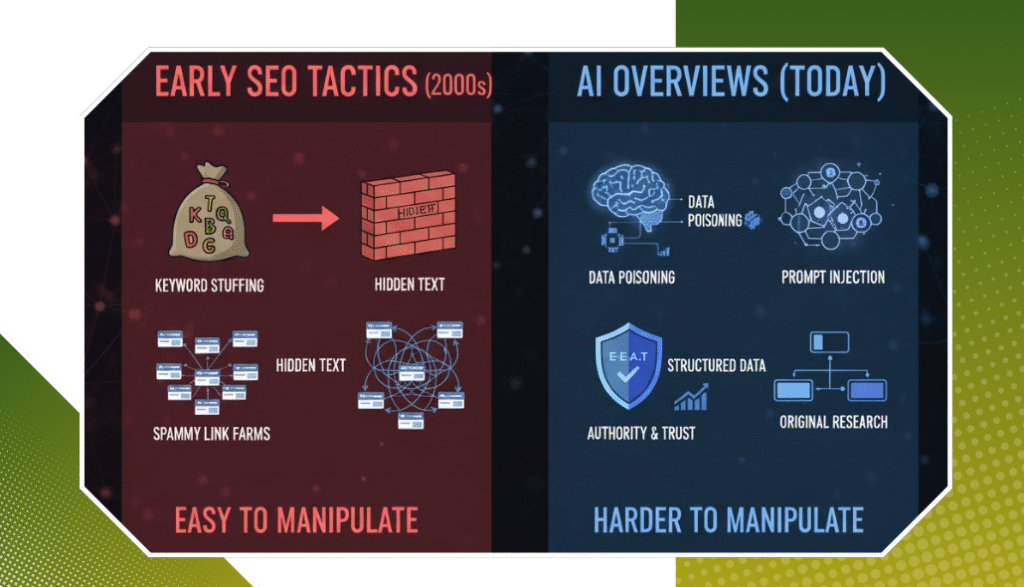Sustainable SEO offers solutions to these challenges by reducing digital carbon footprints through efficient website design, creating enduring content that serves user needs, building authentic relationships with local communities, and implementing resource-conscious optimisation strategies.
The impact of your website on the environment matters to Canadian consumers. Studies show that 78% of Canadians take into account a company’s environmental policies when making decisions. By adopting sustainable SEO practices, you position your website for long-term success and help create a greener digital future.
Understanding Sustainable SEO
Sustainable SEO practices are a strategic approach to digital marketing that focuses on long-term success while minimising environmental impact. Instead of using quick-win tactics that can harm your website’s reputation, these practices prioritise ethical and resource-efficient methods to create lasting value.
The Three Key Pillars of Digital Marketing Sustainability
Digital marketing sustainability is built on three main pillars:
- Environmental Impact: Reducing carbon footprint through efficient coding, optimised images, and eco-friendly hosting solutions
- Economic Viability: Creating content and strategies that deliver consistent value over time
- Social Responsibility: Aligning with ethical consumer values and community expectations
Why Sustainable SEO Matters?
The online world has changed a lot. 73% of Canadian shoppers consciously look for brands that show concern for the environment. Such a change in consumer behaviour makes eco-friendly SEO practices an ethical decision and a business necessity.
Benefits of Implementing Sustainable SEO
Businesses implementing sustainable SEO approaches experience several benefits:
- Enhanced Brand Trust: Building authentic relationships with environmentally conscious audiences
- Improved Search Rankings: Search engines favour websites with consistent, high-quality content and ethical practices
- Cost Efficiency: Reduced resource consumption through optimised digital assets
- Market Leadership: Standing out in the Canadian market as a sustainability-focused brand
These eco-friendly practices are a perfect fit with the increasing need for ethical consumerism, as 82% of Canadians take environmental considerations into account when making a purchase. Implementing these practices enables your site to stay competitive while helping to create a more sustainable digital environment.
High-Quality Content Creation
High-quality content is the foundation of reliable SEO strategies. Search engines favour content that offers true value to the users, so it is imperative to develop useful, interesting, and helpful content.
Understanding User Intent
In order to develop content that actually speaks to your audience, you need to know their needs and expectations first. Below are some of the major ways to find user intent:
- Analyse search queries to gain insights into what users are looking for
- Conduct keyword research to identify specific questions users are asking
- Monitor social media platforms to capture real-time content preferences
- Utilise analytics data to determine which types of content are performing best
Creating Value-Driven Content
After you have identified your Canadian audience’s needs clearly, it is now time to create content addressing those particular needs. Following are some tips to use:
- Research local market trends and preferences
- Analyse gaps in competitor content to determine opportunities
- Create content that addresses unique pain points of your audience
- Include Canadian-specific examples and references to make your content more relatable
Content Development Strategies
In addition to understanding user intent and creating value-driven content, there are several other strategies you can employ during the development process:
- Create comprehensive guides and tutorials that provide in-depth information on a particular topic
- Incorporate relevant data and statistics to support your claims and make your content more credible
- Use clear, accessible language that is easy for your audience to understand
- Include visual details such as infographics and charts to enhance the overall look of your content
- Optimise your content for featured snippets and rich results in search engine listings
Balancing SEO Optimisation and User Experience
As optimising your content for search engines is essential, prioritising user experience is equally crucial. This means incorporating relevant keywords naturally throughout your writing without sacrificing readability or engagement.
Content audits regularly will allow you to recognize SEO optimisation and user experience improvement areas. If you remain up-to-date with current industry trends and constantly work on your materials, you will make sure your content is timely and of use to your readers.
Ethical Link-Building Strategies
Ethical link-building forms the backbone of sustainable SEO practices for Canadian websites. This approach focuses on building honest relationships with reputable websites that share your sustainability values.
Key Elements of Ethical Link-Building:
- Create valuable, link-worthy content that naturally attracts backlinks
- Build relationships with environmentally conscious businesses
- Participate in sustainability-focused industry discussions
- Share expert insights on eco-friendly platforms
Identifying Reputable Partners:
- Study their sustainability efforts
- Verify domain authority and traffic statistics
- Evaluate content quality and relevance
- Check their commitment to environmental issues
You can gain high-quality links by guest blogging, collaborative research studies, or by providing expert opinion on sustainability issues. Canadian businesses often succeed by connecting with local environmental organisations and green business networks.
These authentic connections boost your website’s authority and create meaningful partnerships within the sustainable business community. Search engines recognise and reward these genuine relationship-building efforts, making ethical link-building a crucial component of your sustainable SEO strategy.
Local Search Optimisation for Canadian Businesses
Local search optimisation is vital in connecting Canadian businesses with eco-conscious consumers in their immediate vicinity. Your business can gain significant visibility through strategic local SEO practices:
Google Business Profile Optimisation
Make sure to optimise your Google Business Profile by:
- Adding sustainability certifications
- Highlighting eco-friendly practices
- Sharing green initiatives through posts
- Including photos of sustainable operations
Local Citation Building
Build local citations by:
- Listing your business on Canadian directories
- Focusing on environmentally conscious platforms
- Maintaining consistent NAP (Name, Address, Phone) information
- Partnering with local green organisations
Location-Specific Content Creation
Create location-specific content by:
- Creating neighbourhood-specific landing pages
- Sharing local sustainability initiatives
- Featuring community environmental projects
- Highlighting regional eco-partnerships
These local SEO tactics will bring in eco-friendly customers and solidify your visibility in local search rankings. Canadian consumers increasingly value companies that show a commitment to sustainability, so local SEO is a key tool for expansion and visibility in your market region.
Energy Efficiency in Website Design
Energy-efficient web design is crucial in reducing your website’s carbon footprint. A sustainable website design strategy minimises server resources while maintaining optimal user experience.
Key optimisation techniques include:
- Implementing WebP image formats instead of traditional JPG/PNG files
- Adding lazy loading for images and videos to reduce the initial page load
- Minifying CSS, JavaScript, and HTML files
- Enabling browser caching to decrease server requests
- Choosing green hosting providers powered by renewable energy
Image optimisation best practices:
- Compress images without compromising quality
- Set appropriate image dimensions
- Use responsive images that adapt to screen sizes
- Remove unnecessary metadata from image files
Minimising Digital Bloat
Digital bloat is referring to unwanted code, plugins, and files slowing down website functionality and energy use. This additional digital weight puts a bigger carbon footprint and bad user experience on the table.
Essential Steps to Reduce Digital Bloat:
- Remove inactive plugins and themes
- Minify CSS, JavaScript, and HTML files
- Implement GZIP compression
- Clean database tables regularly
- Delete unused media files
Clean Coding Best Practices:
- Write efficient, well-structured code
- Use semantic HTML elements
- Avoid duplicate code blocks
- Implement proper caching mechanisms
- Reduce third-party scripts
A streamlined website structure improves loading times and reduces server resources. Canadian websites can achieve this by:
- Organising content hierarchically
- Creating logical URL structures
- Restricting HTTP requests
- By employing content delivery networks (CDNs)
- Enabling browser caching
Such optimisations help contribute to sustainability targets and improve site performance, resulting in improved user interaction and search engine rankings.
Emphasising Social Responsibility
Social responsibility shapes modern marketing strategies by integrating sustainable practices into brand messaging. Canadian businesses demonstrate their commitment to environmental stewardship through:
- Transparent Communication: Sharing sustainability goals and progress with customers
- Green Initiatives: Highlighting eco-friendly business practices and partnerships
- Community Engagement: Supporting local ecological causes and projects
Eco-conscious customers actively seek brands aligned with their values. Your website can showcase social responsibility through:
- Dedicated sustainability pages highlighting green initiatives
- Regular blog posts about environmental efforts
- Case studies demonstrating positive ecological impact
- Social proof from environmentally conscious partners
These practices build trust with environmentally aware consumers and strengthen brand reputation. Canadian businesses that integrate social responsibility principles into their digital presence attract a growing segment of sustainability-focused customers.
Research shows that 73% of Canadian consumers prefer brands that demonstrate environmental consciousness, making social responsibility a crucial element of digital marketing strategy.
Measuring Impact and Performance
Tracking the effectiveness of sustainable SEO practices requires a comprehensive measurement strategy. Here are the essential metrics to monitor:
Organic Traffic Growth
- Monthly website visitors
- Page-specific traffic patterns
- User behaviour flow
Engagement Metrics
- Average time on page
- Bounce rate reduction
- Pages per session
- Social shares
Technical Performance
- Site speed improvements
- Core Web Vitals scores
- Mobile responsiveness
- Server response time
Sustainability Indicators
- Carbon footprint measurements
- Page weight reduction
- Resource usage efficiency
- Energy consumption data
Regular analysis of these metrics helps you identify areas for optimisation and validate the impact of your sustainable SEO strategies. Tools like Google Analytics, Google Search Console, and specialised carbon calculators provide valuable data for performance assessment.
Conclusion
Eco-friendly SEO techniques provide Canadian websites with a special chance to leave a strong mark on the internet. Such practices are good for the environment and help in growing businesses, thus making them a fit for the modern green-sensitive market. Green online practices are no longer fashionable; they are now essential to businesses.
Ready to revamp your website’s SEO strategy with sustainable practices? An SEO expert team specialising in implementing eco-friendly SEO can provide solutions tailored to Canadian businesses. Contact Us at Rankingeek Marketing Agency to discover how we can help your website thrive while minimising its environmental footprint.




